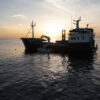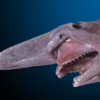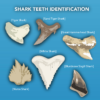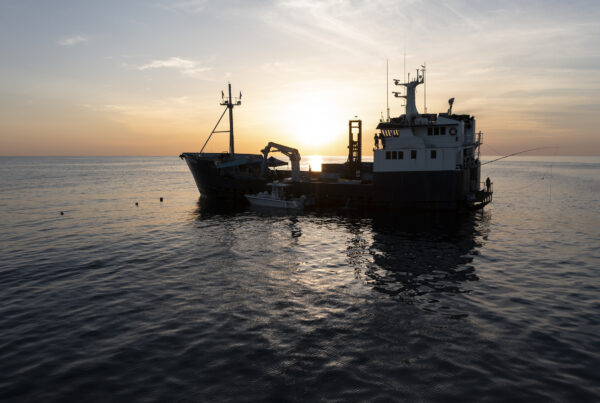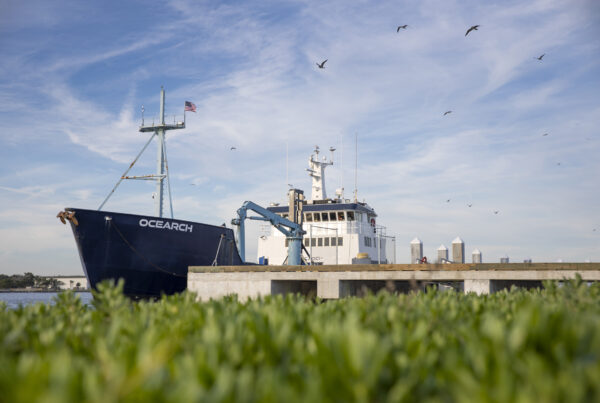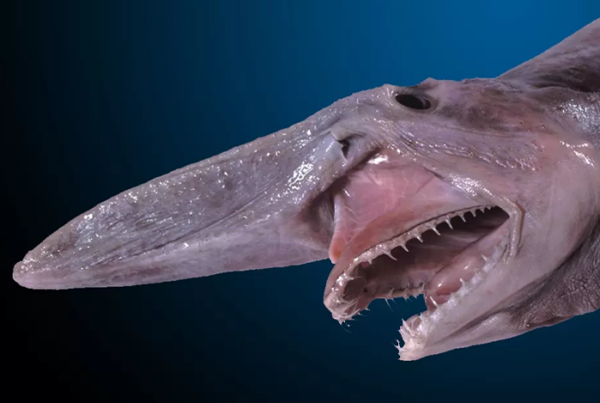OCEARCH Embarks on Expedition Northbound, Bringing Unprecedented White Shark Research Back to North Carolina
White sharks are heading north soon and OCEARCH is headed with them. OCEARCH is embarking on Expedition Northbound, its 45th ocean research expedition that will help further their knowledge on white sharks as they begin to leave the Carolinas region and transition north for the summer.
Alongside 42 collaborators from 28 research institutions, the organization will collect data to support 25 science projects that will help solve, for the first time, the life history puzzle of the white shark in the Western North Atlantic Ocean.
OCEARCH’s data shows that prior to their spring migration north, many white sharks use the productive continental shelf waters around the Outer Banks, North Carolina region as an overwintering and spring staging area before heading farther north. From April to June each year, both male and female sharks can be found in this area in significant numbers, likely taking advantage of the ample food supply to fuel their migration to summer feeding grounds.
“Our comprehensive studies of the white shark, the ocean’s top predator, are in their final stages in the Western North Atlantic, and now we turn our attention to a gap that still remains. This is the great migration of sharks from their overwintering grounds off the southeast U.S. towards their summer feeding areas, as increasing spring temperatures and light levels signal to the sharks that it’s time to move. Before they go, we seek to study the sharks’ condition after their winter south, and in particular, the reproductive state of the adult sharks. Seeing the adults off the Outer Banks region is challenging, as they are spread out and ocean conditions can be rough, but we need data and samples from this part of the population to put the last pieces of the Western North Atlantic white shark puzzle into places,” explains OCEARCH Chief Scientist Dr. Bob Hueter.
During Expedition Northbound OCEARCH hopes to sample mature white sharks in order to gather the fundamental data needed to solve the most elusive piece of the Western North Atlantic White Shark Puzzle: when and where they mate. In order to assess reproductive readiness and shed light on the timing of mating, the science team will collect blood samples from these mature sharks, which will be used to measure hormone levels, and ultrasound technology will be used to scan mature females and evaluate their reproductive status. In addition, assessing the presence of seminal fluid and sperm in males and mating wounds on females would be valuable discoveries. Other important studies include assessing what these sharks are eating when they’re down south, what contaminants they encounter there and how they deal with various challenges to their health and survival.
OCEARCH will also apply tags to the white sharks they study and release, allowing the team and the public alike to track the animal for years to come and increase understanding of what factors affect these animals’ movements across different seasons.
OCEARCH’s Western North Atlantic White Shark Study is the most comprehensive study of white sharks in the world and includes a full health assessment of each shark, microbiological studies, movement, temperature and depth studies through the use of three different tags, and more. With 88 sharks already studied in the Western North Atlantic ocean, OCEARCH is in the last stages of their sample collection in this region. The team has just 12 sharks left to reach their goal of 100 sharks sampled and tagged in the Western North Atlantic.
Over the past 45 expeditions, OCEARCH has traveled around the globe collecting critical data for our oceans. They have studied over 400 animals in collaboration with 200 scientists and helped publish over 75 peer reviewed papers. “I never would’ve dreamed when OCEARCH was founded that we would achieve a milestone like 45 expeditions. We built this organization to do something great for the planet and for the ocean, and to make an impact with data that we can leverage to move the system back to abundance. We’ve done this and included the world at a radical scale. This is a research project that is by the people and for the people. It’s an incredible milestone and I look forward to many expeditions to come,” said OCEARCH Founder and Expedition Leader Chris Fischer.

Expedition Northbound will depart from Wrightsville Beach, NC on April 17 before a final anchoring planned in Wrightsville Beach on May 4. Explore alongside the team in real time on social media @OCEARCH. Additional Expedition Northbound materials, including photo and video assets available for use by the press can be found here.

